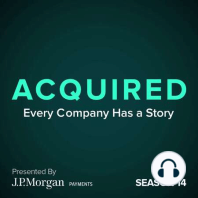87 min listen
Berkshire Hathaway Part I
FromAcquired
ratings:
Length:
190 minutes
Released:
Apr 21, 2021
Format:
Podcast episode
Description
It's time. After 150+ episodes on great companies, we tackle the granddaddy of them all — Berkshire Hathaway. One episode alone isn't nearly enough to do Warren and Poor Charlie justice, so today we present Part I: Warren's story. How did a folksy, middle-class kid from Omaha become the single greatest capitalist of all-time? Why, like Jordan, did he retire (twice!) at the top of his game, only to reinvent himself and come back stronger than ever? As always, we dive in. Let's dance. If you love Acquired and want more, join our LP Community for access to over 50 LP-only episodes, monthly Zoom calls, and live access for big events like emergency pods and book club discussions with authors. We can't wait to see you there. Join here at: https://acquired.fm/lp/ Sponsors: Thanks to Tiny for being our presenting sponsor for all of Acquired Season 8. Tiny is building the "Berkshire Hathaway of the internet" — something they're so dedicated to, they even make and sell bronze busts of Warren & Charlie online! if you own a wonderful internet business that you want to sell, or know someone who does, you should get in touch with them. Just like Berkshire, they commit to quick, simple diligence, a 30-day or less process, and will leave your business to do its thing for the long term. You can learn more about Tiny here: http://bit.ly/acquiredtiny and find their Berkshire Nerds store here: http://bit.ly/acquiredbrknerds Thank you as well to Vouch and to Capchase. You can learn more about them at: https://bit.ly/acquired-vouch http://bit.ly/acquiredcapchase The Warren Buffett Playbook: (also available on our website at https://www.acquired.fm/episodes/berkshire-hathaway-part-i ) 1. Money can create more money. (aka "Compounding") Very early in life, Warren figured out something most people never truly grasp: money can be used to generate more money. It's sounds simple, but once you fully internalize this concept, you'll never see the world the same again. A given sum no longer represents what you could buy with it — a coffee, a phone, a car, a house, etc — but rather what it could grow to become over time. At the extreme, people like Warren are "cursed", seeing prices for goods not as whatever the sticker says, but 5x, 10x, 20x higher — because that's what the opportunity cost of parting with the capital represents. If you own an asset that's compounding at a high rate with no obvious reason it will stop... dear lord do not interrupt it!! Most people are tempted to meddle: lock in gains, cover other losses, actively trade, or otherwise "manage" their investments. In the long run these actions are almost assuredly all value-destructive behaviors if you own truly great businesses. 2. Align incentives: be a doctor, not a prescriptionist. Warren likened stockbrokers — who got paid based on volume of trades placed, not investment performance — to "prescriptionist" doctors who were paid by their number and type of pills prescribed, versus actual patient outcomes. Once Warren created his investment partnerships (and then later transformed Berkshire Hathaway into something similar), he not only unlocked hugely better outcomes for his"patients", but allowed created a path to pursue his own dream and become fabulously wealthy in the process. 3. You can't expect to control other people's emotions around money (or anything else). However with the right "ground rules", you can mitigate the impact of others on your business and decision making — and even use them to your advantage. Warren's early partnerships had a few ground rules and norms: partners will not know what securities are held, trading in/out is allowed only 1 day / year, and Warren will consistently set low expectations (leaving himself ample room to over-deliver). These set the stage for nearly complete freedom for Warren to operate as he saw fit — to the immense gain of his limited partners. 4. Sins of omission (selling or passing) nearly always cost more than sins of commissio
Released:
Apr 21, 2021
Format:
Podcast episode
Titles in the series (100)
Episode 25: The Facebook IPO: Ben and David tackle their first IPO episode, starting with the largest tech IPO of all time, Facebook. by Acquired
